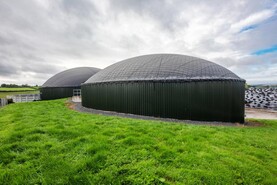The European Commission has adopted temporary measures aimed at allowing the transport of Ukrainian grain into the EU by road to continue after bans were implemented by some member states.
The Commission recognised that the influx of grain into the EU from Ukraine created “bottlenecks” in member states bordering the country and has proposed to allocate funds of €100m to farmers there.
Commodities covered by the measures are wheat, maize, rapeseed and sunflower seed grown in Ukraine, with the measures adopted until 5 June 2023.
Some countries along the EU’s eastern borders had moved to ban Ukrainian in recent months but many of these bans were lifted as EU talks on the issue went on.
The funds proposed are to be split between farmers in Bulgaria, Hungary, Poland, Romania and Slovakia affected by the influx of Ukrainian grain into markets.
Little detail has been given on what the measures will mean in practice.
Brussels has said that the four grains and oilseeds can circulate freely in EU countries other than the “five frontline” countries listed above.
However, the goods covered can still "circulate in" or "transit" through these five member states by a common customs transit procedure.
Farmer funds
The five countries eligible for aid will be able to beef up the EU funds to the tune of 200% with funds from their national budgets.
Poland is in line for the largest allocation of these funds at just under €40m of the €100m proposed.
A separate €56.3m package under the EU’s farm emergency fund is already planned to reach Bulgarian, Polish and Romanian farmers.
Tensions over the flow of Ukrainian into Poland saw the state’s agriculture minister Henryk Kowalczyk resign last month as increasing numbers of farmers were taking to the streets over the issue.
Easier access
In June 2022, the EU opened up its grain markets to Ukraine tariff-free and quota-free for a period of one year.
The Commission is seeking to extend this access to EU markets for another year before it expires in June.
The EU’s Solidarity Lanes also allow Ukrainian grain to enter the EU with fewer customs checks than before the war broke out.






 This is a subscriber-only article
This is a subscriber-only article










SHARING OPTIONS: